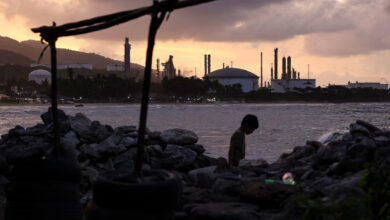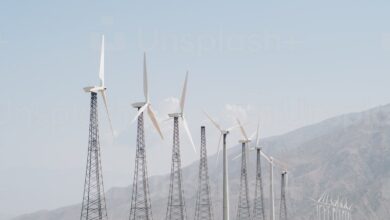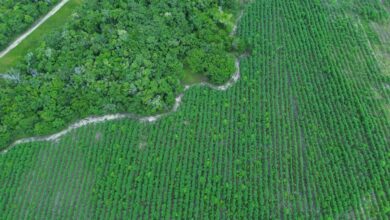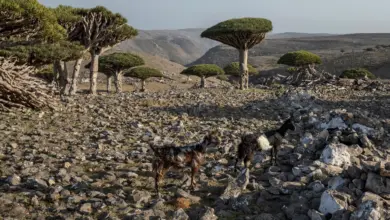On Monday, the United Nations Climate Change Summit began in Copenhagen, where delegations from all over the world are discussing the dangers facing the planet caused by rising global temperatures.
Egypt lies at the forefront of the battle with the elements since the country’s makeup is as fragile as it is ancient. The Delta, the Nile basin, the coral reefs in the red sea and natural wetlands across the country could all be at risk if nothing is done. Food security will potentially be affected making the country even more dependent on imports, and tourism may practically disappear.
According to Mohamed el-Raey, environmental advisor to the Arab Academy of Science and Technology and chairman of the Environment Committee at the Supreme Council of Egyptian Universities, the Egyptian delegation in Copenhagen must convince the world of Egypt’s precarious situation and demand a coordinated strategy. "Egypt and the international community must work together in developing sustainable strategies and technologies,” he says.
Al-Masry Al-Youm spoke to el-Raey about the environment, climate change and the potential climatic dangers facing Egypt in the years ahead.
Al-Masry Al-Youm: Today, climate change is a ‘hot topic’. How long have you been dealing with it?
Mohamed el-Raey: My colleagues and I first realized that there was an impending problem back in 1989. Nobody was really interested in it then. Three years later we founded a consortium together with representatives from Bangladesh and the Netherlands to inform the world of the dangers facing our countries, and to conduct more research. But back then we had a hard time finding people who would listen to us. We told farmers their lands would be in danger in the future. This didn’t frighten them in any way. Even now it is difficult to be heard. But the fact that it is being spoken about on a global level definitely helps.
Al-Masry: Of these three countries you named, Egypt is in a fairly unique position. It’s vulnerable on different levels, isn’t it?
el-Raey: Yes, the ecological balance in Egypt is very precarious. There has not been sufficient research into the exact influence climate change might have on different sectors in Egypt, but surely the fishing industry, agriculture and tourism are going to be hard hit if nothing is done. However, the extent of the damage has not been examined enough. How will our national monuments react to climate change for example? And what will the future hold in store for the oases? These are questions nobody has asked.
Al-Masry: The Delta region, perhaps one of the most important regions for Egypt, is also one of the most vulnerable. What dangers does it face?
el-Raey: The northern part of the Delta is facing the biggest and most immediate threats. On the one hand the land is subsiding. There are three main reasons for this. Firstly the Nile brings in shrinking amounts of silt each year. A large percentage of the fertile silt is deposited in front of the Aswan High Dam and never reaches the coastal areas. Secondly, subsidence is caused by the extraction of oil and groundwater in coastal regions and off shore. In addition to that, plate tectonic activity contributes to the problem. The land around Alexandria has been subsiding at the rate of three millimeters per year, and around Port Said at four millimeters per year.
On the other hand we have the problem of rising sea levels. Globally, sea levels are rising by fifty centimeters per century. But it is accepted that these numbers are low. There have been other estimates of over a hundred centimeters.
Al-Masry: Where exactly is this occurring?
el-Raey: I would say especially around Alexandria, Rosetta and Port Said. All these places are built on low land and are inhabited by a large population. Take Port Said. If the sea rises by fifty centimeters and the land subsides by forty centimeters, then in a hundred years there will be ninety centimeters of problems. But these are low estimates.
Al-Masry: Can you give us an idea of what ninety centimeters of problems will look like?
el-Raey: To be sure, the effects will be devastating, but it is difficult to say exactly what will happen. My estimates are that as much as thirty kilometers inland will suffer gravely if no drastic measures are taken. Roughly ten to twelve percent of the Delta is in direct danger of flooding. The rest will suffer from severe saltwater intrusion. The biggest problem would be the groundwater. With rising seawater more salt will reach the groundwater which will affect the chemical makeup of the soil. Productivity of the land will fall, and some crops will not be able to survive in these circumstances. This means millions of people will be displaced and thousands of hectares of agricultural land will be lost.
Also the water in the five northern lakes of Egypt, which are of vital interest to the ecological equilibrium in the country, could turn brackish. This will have dire consequences for wildlife in the region and for the fishing industry since fishing in these lakes constitutes sixty percent of the total amount of fish caught in Egypt.
Furthermore, the tourism industry will practically disappear. Ninety percent of tourists visiting Egypt come for the beaches and of course, these will be the first thing affected. As for the coral, coral reefs in the red sea are subject to a bleaching process which is caused by rising temperature of the seas.
Al-Masry: What is being done to prevent this from happening?
el-Raey: At the moment all the different ministries are working in their own specific field of interest. The Ministry of Agriculture is conducting research, the Ministry of Tourism is figuring out what they can do, and the Ministry of Public Works and Water Resources is also looking at the problem. These efforts are well intended, but there is no effective coordination. The government has now initiated a committee to do exactly this, but the committee lacks any authority.
Al-Masry: What can be done to avert a looming climatic catastrophe?
el-Raey: Egypt now produces 0.7 percent of the world’s greenhouses gasses. If we could reduce this to zero it would still take forty years to see the effects of such a decrease. The international community has until now emphasized the importance of reducing emissions, or mitigation. But in my view, we should be focusing on adapting our vulnerable areas to the coming changes.
But adaptation is not a very popular subject among developed countries since mitigation for them is a way of avoiding the problem. Adaptation means that everyone, especially governments, should act now! And there is lot to be gained from taking adaptation seriously. We can design and develop new sustainable techniques which will someday be necessary anyway. For example techniques to improve the conservation of water and energy.
Al-Masry: And on a smaller scale? What can be done by individuals to avoid the sea rising and the degradation of agricultural land?
el-Raey: Like I said, I don’t believe there is a lot that we can do to stop the sea level from rising. What we can do is start using our resources more efficiently and start investing in new technologies. For example, in Egypt eighty percent of the water is used for agriculture but irrigation methods have stayed the same even though the population has grown rapidly. By using drip irrigation farmers can grow the same amounts with a lot less water. But to update farmers and the existing structures would take years. So we need strong institutional capabilities to be able to implement these changes.
Al-Masry: The climate summit lasts until 16 December. What should be Egypt’s goal for the coming days in Copenhagen, and what are your expectations?
el-Raey: It is in our vital interest to raise funds to counter the challenges we are facing. To transfer technology, like solar energy and conservation methods, from developed to developing countries requires funds. We must convince the world of our precarious situation and demand a coordinated strategy. And also, we should all start putting some real pressure on greenhouse gas producing countries, like the United States who haven’t even ratified the Kyoto agreement.
I hope some real results will be achieved, and that the world will start to realize that adaptation is as important as reducing emissions.




